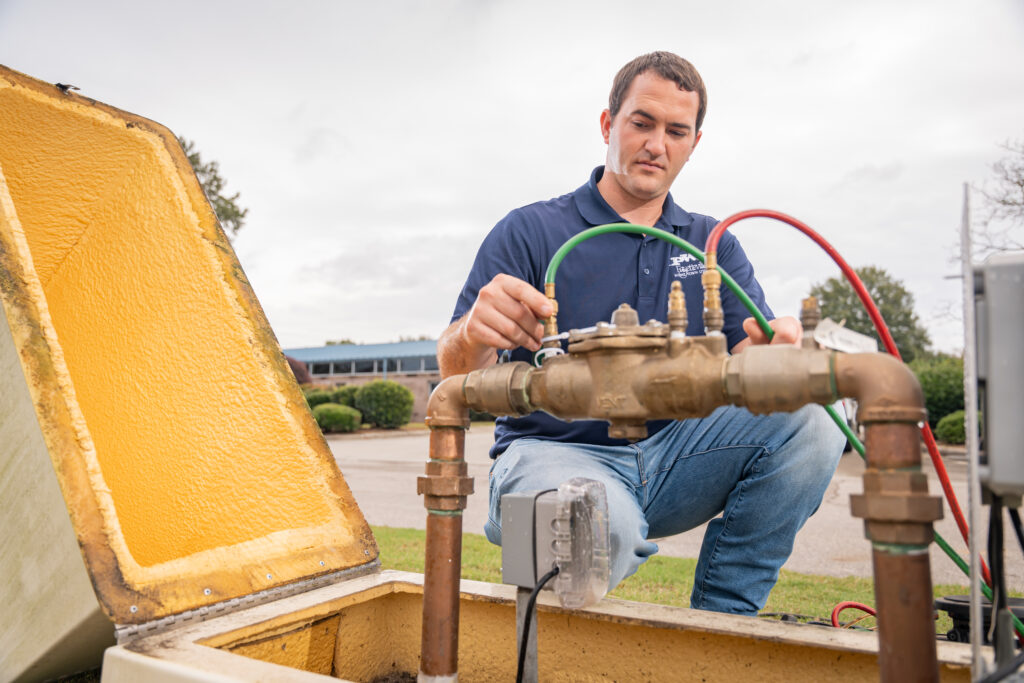About Backflow Prevention

The current NC Plumbing Code in conjunction with the NC General Statutes Governing Public Water Supplies require lawn irrigation systems be equipped with a backflow preventer to protect our drinking water from chemicals present on irrigated areas. The City of Fayetteville’s Cross Connection Control Ordinance, created through PWC and City collaboration, helps ensure compliance with state law and to ensure the quality of drinking water for safety reasons.
Property owners are responsible for owning and maintaining the backflow devices while PWC is responsible for ensuring that the backflow device is in working condition. This is done through our lawn irrigation testing program where a PWC contractor tests all residential backflow devices. (Non-Residential are required to test their own devices and provide results to PWC to monitor compliance.)
Some residential irrigation customers have recently been notified that inspections of their backflow device found it is in need of repair. (View sample notification) If it is determined that the current device cannot be repaired, it must be replaced according to current state plumbing code requirements.
Many of the existing backflow devices installed in the Fayetteville area utilize a double check valve design that is typically installed underground. The current NC Plumbing Code no longer allows these devices to be installed in new installations or when existing backflow devices are unable to be repaired and must be replaced. Currently a Reduced Pressure Principal Assembly or RPZ device is required to be installed. These devices are typically installed above ground. Licensed plumbers, the City of Fayetteville and PWC are legally bound by the State Plumbing Code, which requires devices to be replaced if they cannot be repaired and fulfilling their responsibility for complying with and enforcing state law.
The City’s Cross Connection Control Ordinance does require backflow devices be repaired within twenty-one (21) days of initial notice. If you chose not to make the necessary corrections to the device, you may elect to have PWC disconnect your lawn irrigation water service.
Any licensed plumber can assist you in determining the appropriate course of action for your backflow preventer. However, once the repair or replacement is complete, it must be tested by a PWC certified tester. So it may be in your best interest to select a licensed plumber who is also a PWC certified tester. Below is a list of certified testers as of January 2026*:
- 1-800-Plumbing: (910) 483-9388
- 1st American Plumbing Inc.: (910) 734-1557
- A&K Services: (910) 476-5866
- A1 Landscaping: (910) 850-6236
- All American Plumbing: (910) 822-4287
- All American Fire Protection: (910) 496-0600
- Alpine Construction Services: (919) 935-1388
- Bass Air & Plumbing: (910) 424-3570
- Battles Backflows: (919) 888-5208
- BFPE International: (800) 849-8886
- Billy’s Plumbing Service: (910) 485-5175
- Blackwell Landscaping: (910) 237-1044
- Blanton’s Heating And A/C: (910) 867-5309
- Bottle Free Water Plumbing By BFW: (910) 229-2900
- Budget Rooter: (910) 960-2564
- C&C Irrigation And Lighting, Inc: (910) 980-1535
- Cardinal Landscaping: (910) 867-9595
- Carolina Fire Protection: (910) 892-1700
- Crossroads Fire Protection Inc.: (919) 207-3855
- Daniel’s Plumbing Co.: (910) 423-7444
- Dave Marks Irrigation: (910) 806-7955
- Denali Piping & Mechanical Llc: (910) 527-1696
- Dennis Plumbing: (910) 973-5069
- Fayetteville Plumbing Company: (910) 818-6526
- Fire Service Pros LLC: (910) 263-8816
- Flow-Rite Plumbing: (910) 466-4419
- Fulton Plumbing: (910) 988-3187
- Glory Facilities Maintenance: (919) 798-1517
- Green Biz Nursery: (910) 323-8811
- Haire Plumbing: (910) 483-1421
- Happy Contracting Services LLC: (910) 495-5124
- Hunt’s Backflow Testing: (910) 374-6790
- Irrigate NC: (910) 308-4046
- Ivey Mechanical: (910) 304-1277
- Jason Durden: (910) 734-8754
- McKenzie Plumbing Co.: (910) 764-2200
- Mike’s Plumbing: (910) 885-5353
- Mobley Enterprises Inc.: (910) 987-0701
- O’day Plumbing Services: (910) 476-1119
- Phoenix Fire Protection: (919) 774-3042
- Pipeworx Plumbing: (919) 775-1020
- Proflow Plumbing And Drain Solutions: (910) 929-7459
- Ray Parker Jr.: (910) 308-8963
- Roto-Rooter: (910) 488-6229
- Timmy Tyner: (910) 494-5286
- Titan Environmental Solutions: (910)-658-9665
- Unlimited Fire Inspection: (919) 894-2292
- Unifour Fire and Safety: (828) 328-6363
- Wade Hardin Plumbing: (910) 486-0334
- Woods Plumbing: (910) 920-3908
*This is a list of companies who employ certified backflow prevention assembly testers approved to test and repair all types of backflow prevention assemblies installed in the PWC water system. They are listed in alphabetical order; there is no implication of preference of companies.
What is Cross Connection and Backflow?
PWC works hard to provide you with water that’s even cleaner than the standards required by the EPA. Providing a safe and ample water supply requires high tech facilities and complex procedures. But our customers also play an important role in protecting our drinking water.
Remember: Cross Connection + Backflow = Contaminated Water
Cross Connection occurs when water from the public system comes in physical contact with a potential source of contamination. For example: putting a water hose directly into swimming pool water that is treated with chemicals – or using a fertilizer spray attachment on your hose without a backflow prevention device.
Backflow happens when something causes a drop in water pressure and the water flows in the reverse direction.
Learn more about Cross Connection & Backflow Prevention (PDF)









